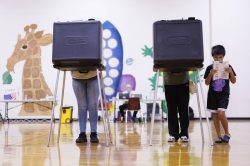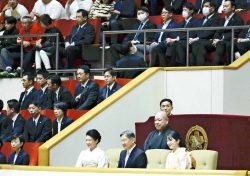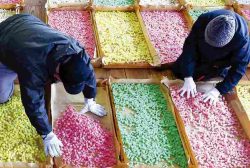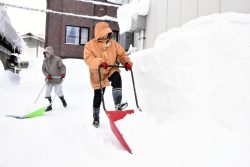Students play games in the cafeteria at Building 21, a public high school in Allentown, Pennsylvania.
11:30 JST, November 18, 2024
ALLENTOWN, Pa. – The students had awoken to the news of Donald Trump’s presidential victory only an hour earlier and were still processing what it would mean for them and their families.
About a dozen gathered in the cafeteria of their high school, which sits on the edge of this former industrial city’s struggling urban core. All were Latino. They had spent Election Day as poll workers, helping non-English speakers, the elderly and the disabled cast their ballots.
Shannon Salter, one of the school’s civics teachers, asked them about their work, and the students, talking over one another in bursts of teenage enthusiasm, spoke of the feeling of importance it gave them. After a few minutes, the conversation turned toward the inevitable.
“So, how do you feel about the result?” Salter asked.
“I hate it. I hate it,” said Adrianna Rodriguez, 17. “Oh my God, I hate the stupid result.”
One of the students complained that she was tired of all the election talk. “Let’s worry about 17-year-old girl stuff,” she said.
Adrianna slammed her hand down on the cafeteria table. “This is 17-year-old girl stuff!” she yelled. On this morning, the day after Election Day, most of her classmates agreed.
Five months earlier, Salter had struggled to get any of her students at Building 21, a public high school with a student body that’s about 90 percent Black and Hispanic, to care about the presidential election. In a class of 12 seniors, only four said they planned to vote in November; none of them seemed particularly enthusiastic.
Now it seemed to Salter as if everything had changed. Many of her students still struggled to grasp some basic facts about the country’s democracy: how the electoral college works; what powers the president wields. But they knew Trump and his “Make America Great Again” movement, which had dominated American politics since they were in elementary school and seemed likely to endure for years, if not decades, to come.
This time Trump’s victory was powered, in part, by Latino voters in places like Allentown and surrounding Lehigh County, where Trump cut his margin of defeat from nearly 8 points in 2020 to less than three. Almost all of Salter’s students could quote racist or derogatory statements that Trump had made about Hispanics, Blacks or immigrants over the past nine years. And almost all said they had a family member who had voted for him on Election Day.
In the hours after Trump’s win, the students were desperate to talk about what his presidency would mean for their lives and their majority-Hispanic city. One student said she had heard that Trump might order the military to round up people who are in the country illegally. Another asked if he could use the power of the presidency to protect abusive police officers or change the country’s voting laws to hold onto office.
His victory seemed to hit the female students in the cafeteria most viscerally. Several said they feared that Trump would try to pass a nationwide abortion ban that would force them to have a child even if they were raped or their pregnancy endangered their life. “You’re literally taking away the protection of our bodies,” said Jennitza Claudio, 18, who had just cast her first ballot.
Jennitza’s journey was typical of many students at her school. She, her mother and older sister had moved to the Bronx from Puerto Rico when she was 2, cycling through shared apartments and shelters until her mother married, found work as a home health aide and landed an apartment in Allentown.
In late October, Jennitza convinced her mother, who doesn’t speak fluent English, to register and vote for the first time.
“I don’t want to be involved in something that could go horrible,” she recalled her mother initially protesting.
“You shouldn’t be seeing it like that,” Jennitza replied. “You should be seeing it as a change to my future.”
Both cast ballots for Kamala Harris.
Salter understood that for Jennitza and many of her classmates, the election result wasn’t just about a set of policies. To many of them, it felt as if their country had rendered a verdict on their value to the country and found them less worthy than others.
The students in the cafeteria fell silent. Jennitza took a deep breath.
“This may not be the day for it,” Salter told them, weighing her words carefully, “but democracy takes work … hard work.”
And with that, they gathered their belongings and headed to class.
‘I have hope’
When Harris replaced President Joe Biden at the top of the ticket and began speaking more forcefully about abortion and reproductive rights, Salter said her female students started to take notice.
The biggest shift, though, came in the election’s final two weeks when a comic at one of Trump’s closing rallies jokingly dismissed Puerto Rico as a “floating island of garbage.” Suddenly, Allentown and the surrounding Lehigh Valley, home to tens of thousands of Puerto Ricans, became a major focus for both campaigns.
On Oct. 29, Trump held a rally at a downtown arena, just a few blocks from Building 21 high school. Harris followed a week later.
Salter was standing in line for the Harris rally on the final day of the campaign when she spotted Isaiah Mugwindri, a Building 21 senior, who had traveled more than an hour by city bus to get there.
Home for Isaiah was a Motel 6 off the interstate. He’d been stuck there with his mother and stepfather since 2021 when his parents lost their jobs, he said. The motel owner gave them a break on their lodging, and in exchange, his mother cleaned the rooms – as many as 45 a day.
His mother and stepfather didn’t plan to vote, he said. At 17, Isaiah was too young to cast a ballot. But he wanted to see Harris, who he imagined might be able to understand something about his life and his struggles in Allentown. For weeks, election ads and commentary had dominated the social media feeds of Building 21 students. Most of what Isaiah knew about Harris came from TikTok, he said.
He liked that both he and the vice president were the children of Black, immigrant fathers. Her father hailed from Jamaica. His, who had been in and out of prison since he was born, came from Zimbabwe. He liked Harris’s style as well – the way she danced and laughed.
“She knows how to tell a joke without insulting anyone,” Isaiah said.
Inside the auditorium, he said he teared up as Harris, clad in a dark blue pantsuit and pearls, took the stage to Beyonce’s “Freedom.” And he cheered along with the crowd of more than 3,000 as the vice president told them that she had always believed in the “nation’s promise” because she, as the child of a middle-class, single mother, “had lived it.”
Harris’s only flaw, Isaiah said, was that she didn’t seem to have many programs designed to help people like him. He knew from TikTok and Harris’s speeches that she wanted to give first-time home buyers $25,000 toward their down payment. But his parents had no plans to buy a home. They couldn’t even afford a security deposit on a rental apartment.
“People talk about the low class and the middle class as if they are the same,” he said. “But you can really be lower than middle class.” He often wondered why politicians lumped the two groups together. Maybe, he speculated, there are more middle than lower-class families? Or maybe politicians ignore lower-class voters because they don’t give money to campaigns or volunteer on behalf of candidates?
“I’ve been thinking about it forever,” he said.
When the rally was done, Isaiah met up with Salter and another teacher outside the auditorium. Salter asked him what he thought of Harris’s speech. “I have hope, and I have faith,” he said, as the crowd streamed toward the parking lot. “I love Kamala.”
On election night, Isaiah watched as the TV networks called Pennsylvania for Trump and then stayed up through the former president’s victory speech. His parents were asleep in the motel bed next to him. Isaiah believed racism and sexism were the driving forces behind Harris’s defeat.
“America as a whole failed her,” he recalled thinking as he turned off the television around 3:30 a.m.
Two kinds of Trump supporters
The next morning, the halls inside Building 21 were buzzing with students talking about the election. “We’re all going to get deported!” several students joked. The school is prohibited from asking students about their immigration status, but the question of what becomes of the undocumented in the second Trump term is personal for many Building 21 students and their families.
A little after 10 a.m., a Latino student stopped by Salter’s office. “What exactly is going to happen?” the ninth-grader asked her. Salter gave him a quick primer on Trump’s promise to remove undocumented immigrants from the country and the difficulty he would probably face in executing it.
The student listened attentively and then melted back into the rush of students streaming through the hall outside her office.
Salter’s goal as a civics teacher was to convince her students of the importance of politics in their everyday lives. She got her wish, but not in the way that she had hoped or expected. Her phone pinged with a text message from Vanessa-Lusianne Belony, a former student who had recently started her first year at Temple University’s Tokyo campus. In the spring, Vanessa told her that she couldn’t imagine voting for any of the presidential candidates. Her view, she texted, had changed.
“I realized months ago when Biden dropped out that voting was really important,” she explained. “It sucks things went the way they did, and I’m hoping some of my classmates realize the impacts too.”
Illianys DeLeon, a 17-year-old senior, had learned about Trump’s victory via an early morning text message from a friend.
“Dude I’m scared,” she replied.
“Of what?” her friend asked.
“Of where things might go from here now that he’s won,” she texted.
Illianys found it baffling that Trump had received more support from Latino voters in 2024 than in his previous presidential runs, given his mass deportation pledge. Most of the students at Building 21 knew someone – a family member or parent of a friend – who was undocumented.
In her civics class later that morning, Illianys asked how so many Latinos could vote for Trump “knowing that he has a plan to send immigrants back.”
A few seats away, Mikeily Castillo, a 16-year-old Trump supporter, offered one answer: “When he was president,” she said, “my family was not struggling.”
Several of the students said they divided Trump supporters into two categories. There were the “good ones,” like their family members, who bridled at his racist statements but voted for him anyway. And there were the “bad ones” who believed everything he said.
As Illianys moved from class to class, she continued texting with her friend who earlier that morning had informed her of Trump’s victory.
“He can’t even do anything to you basically,” her friend wrote.
“It’s not what he can do to me directly,” she replied. “It’s the power he’ll have over the country and the government and how it is going to affect each and every single one of us.” Illianys, her mother and little brother had fled Puerto Rico in 2018, a few months after it was slammed by Hurricane Maria.
She blamed Trump’s inattention for the island’s slow recovery following the hurricane. And she worried about what Trump’s victory might mean for her mother, who is married to another woman.
Illianys said she only recently become interested in politics, drawn in by the ads that had flooded her phone in the final weeks of the campaign and the increasingly dire commentary she saw on social media. She still found much of it confusing.
“I don’t know that much about the Constitution and Congress and what happens with them,” she confessed.
The school day was ending. Illianys texted her friend and asked him if he had voted for Trump.
“I chose to not vote,” he wrote back.
“You need to vote next year, dude,” she replied.
Who has the power?
Salter had long imagined that her students would be drawn into politics by the possibilities that it promised. She wanted them to see themselves as agents of the nation’s history, participants in the founders’ ongoing quest to form a more perfect union.
Instead, her students had been pulled into the political process by the fear, uncertainty and anger that dominated the 2024 election. Would their passion melt into cynicism or morph into action?
Jennitza, the student who had persuaded her mother to vote, returned home from school around 4 p.m. and checked on her stepfather, who had lost his legs to diabetes years earlier.
In the fall, he suffered another major health setback, leaving him bedridden, unable to sit up or speak. Jennitza’s mother was at her home health aide job, caring for a client. So Jennitza said she gave him his medicine and trimmed his eyebrows and hair.
She was scrolling through TikTok when she happened upon a snippet of Harris’s concession speech and decided she should watch the whole thing. Lying in bed, she listened as Harris promised to continue fighting for the principles that had fueled her campaign and urged her followers to do the same.
“You have the power,” Harris said, her voice growing louder and more insistent. “You have the power.”
Jennitza didn’t feel very powerful. She thought about Trump, the next four years of her life and the country’s fractious politics, which filled her not with a passion to fight but rather a feeling of pessimism and dread.
“The system is going to fail us again and again,” she recalled thinking. She dropped her phone on her nightstand and fell asleep.
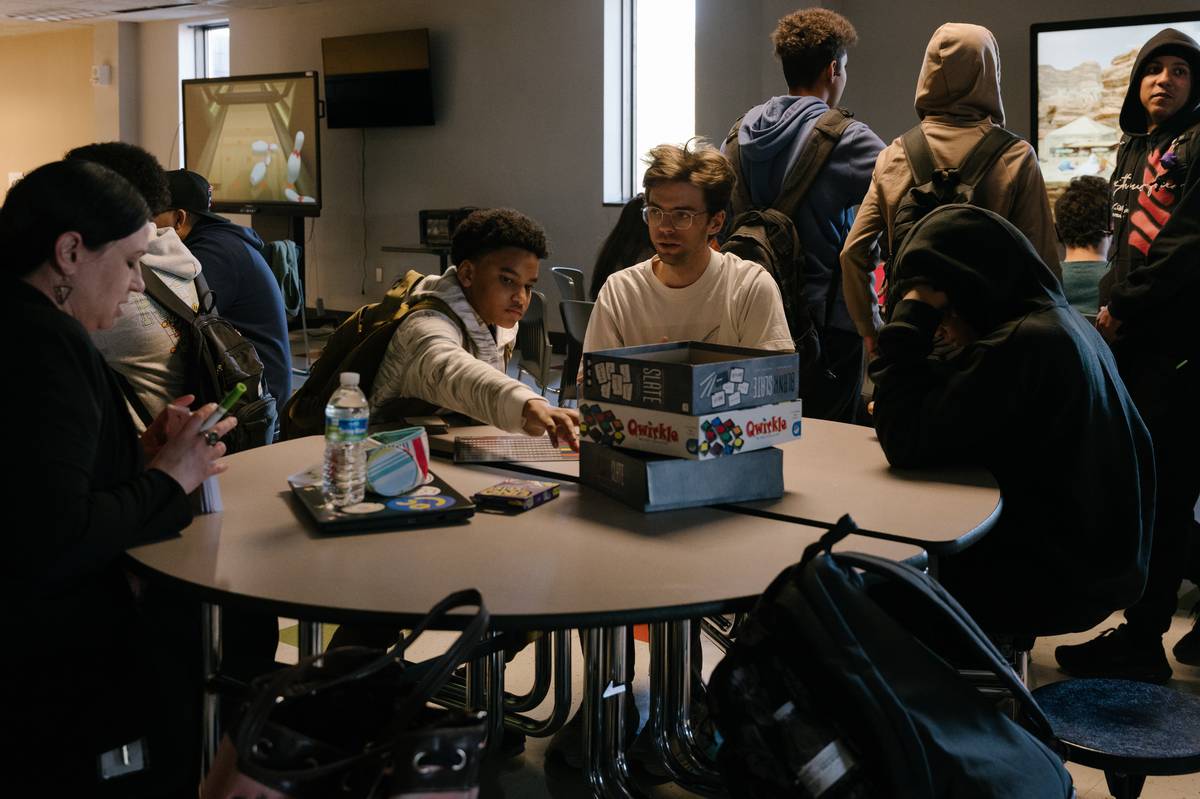
Top Articles in News Services
-

Prudential Life Expected to Face Inspection over Fraud
-

South Korea Prosecutor Seeks Death Penalty for Ex-President Yoon over Martial Law (Update)
-

Trump Names Former Federal Reserve Governor Warsh as the Next Fed Chair, Replacing Powell
-

Suzuki Overtakes Nissan as Japan’s Third‑Largest Automaker in 2025
-

Japan’s Nikkei Stock Average Alls from Record as Tech Shares Retreat; Topix Rises (UPDATE 1)
JN ACCESS RANKING
-

Univ. in Japan, Tokyo-Based Startup to Develop Satellite for Disaster Prevention Measures, Bears
-

JAL, ANA Cancel Flights During 3-day Holiday Weekend due to Blizzard
-

Japan Institute to Use Domestic Commercial Optical Lattice Clock to Set Japan Standard Time
-

China Eyes Rare Earth Foothold in Malaysia to Maintain Dominance, Counter Japan, U.S.
-

Japan, Qatar Ministers Agree on Need for Stable Energy Supplies; Motegi, Qatari Prime Minister Al-Thani Affirm Commitment to Cooperation





